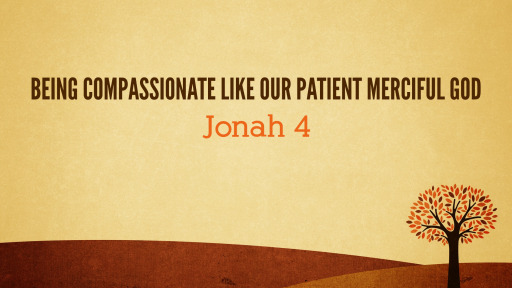(Jonah 4) Being Compassionate like our Patient Merciful God

Jonah 4 concludes one of the shortest books of the Bible. In the course of 4 chapters, we are challenged with God's incredible power and rule; hurling a storm onto the sea, appointing a fish, a plant, and a worm to teach a rebellious prophet. Yet, we also see God patient, merciful, and compassionate upon undeserving prophet and an underserving violent and wicked city. We are struck with amazement that God would so slow to anger and so quick to extend mercy. The prophet Jonah teaches us how bitterness and anger can cause us to flee the presence of God and hate the works of God. May we instead, have enough faith to trust God to apply mercy in Holy and just ways. The book of Jonah provides an important lesson for how God's people should resist anger and instead extend Christ-like compassion.